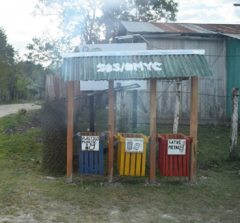by Omar Elsharkawy, CFICE Admin RA
I saw the Alternative Spring Break program as a great opportunity to travel and learn about sustainability, so in October 2014 I decided to participate. The Alternative Spring Break program at Carleton University is a 6-month immersive community service learning (CSL) program that connects students’ academic learning to hands-on community experiences. The program’s main attraction is its February service learning trip, where students are sent to a specific community to work with one of the program’s many partner organizations.

Recycling bins made by students participating in the Alternative Spring Break trip to Uaxacutun, Guatemala.
© 2014 Omar Elsharkawy
As part of my trip, I traveled to Uaxacutun, Guatemala to assist the community with implementing creative recycling. As an environmental studies student, I initially found this CSL opportunity very exciting since I thought it would give me insight into how a community becomes more environmentally conscious in a grassroots fashion. Though we participated in useful tasks, from picking up and separating plastic, paper, and garbage to painting and labeling recycling bins, I noticed that the community seemed to expend greater energy on hosting us than what we were giving them in return. For example, the community put a lot of effort into welcoming us through a huge community-wide welcome party. They also provided us with accommodations, and multiple meals throughout the day. As the trip progressed, it became evident to me that we were using up a lot of the community’s already scarce and valuable resources.
Upon returning and reflecting on the trip, I had mixed feelings. I was under the impression that we would be mostly working with and for the community during our time in Uaxactun, however I felt that my group and I benefited the most from the trip.
Voluntourism is problematic because it reinforces the false stereotype of the need for northern aid. Children in the community saw us, the students from the global north, as people with knowledge and skills beyond those of their community leaders; on several occasions the children and community members watched as their community leaders and elders thanked us for lending them our assistance. We were also teaching children at the local school English words related to health and recycling. Being positioned as teachers does not demonstrate collaboration between the community and Westerners. Rather, it reinforces to the children the idea that Westerners are the ones with the answers and that communities like theirs must depend on the West for guidance.
Because of the very short duration of our trip, and our lack of skills in carpentry (among many other factors), I believe the people of Uaxactun were more than capable of implementing this recycling project themselves. It could have been a great community engagement project by the community and for the community. The community did, of course, benefit from having recycling bins, but what is the purpose of Canadian students travelling such great distances to help the community paint recycling bins, and do the benefits to the community reconcile in the end with the amount of resources that the community used to host us?
Overall, the experience has made it clear to me that international service learning needs to be radically restructured. For example, students could commit to working with their home communities by having fundraisers to assist with the community’s needs with building infrastructure. This type of student contribution would be much more beneficial to the community as the community would be able to specifically outline the developmental barriers they are facing.
If you are planning to go on an international volunteer trip during spring break this year, I recommend you do your independent research of where your money is going. Look into whether your money is going to the community directly or whether it’s mostly covering administrative costs or big salaries. Finally, make it a goal to yourself and your group to work towards long-term structural change prior and subsequent to your trip.